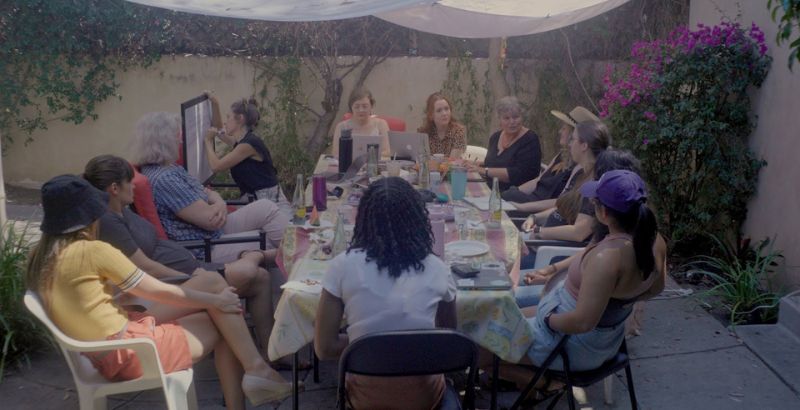
The documentary film Plan C held its Texas Premiere on March 12, 2023 at the 2023 SXSW Film and Television Festival in Austin, TX. As Texas prepares rule on a lawsuit seeking to revoke FDA approval for the commonly used drug mifepristone, Plan C finds itself on the frontlines of the abortion access battle upon its debut deep in the heart of Texas.
We had the opportunity to sit down with Plan C director, Tracy Droz Tragos, to discuss her approach to the highly tense topic and the take a temperature of how it feels to bring her documentary to one of the most hostile states in the fight for a woman’s right to choose.
CAIT KENNEDY FOR BUT WHY THO: Thank you so much for sitting down with us. I’m Cait Kennedy of But Why Tho?, I absolutely loved Plan C. There’s so much to talk about and I’m very excited to talk about it with you! As a viewer, I was able to contextualize this film within the very specific space and place of being a Texas woman watching this at a Texas film festival, in a space where I have been directly, and to my detriment, impacted by anti-choice legislation. As a filmmaker, how does it feel for your film to be screening here in Austin, Texas, before Texas audiences?
PLAN C DIRECTOR, TRACY DROZ TRAGOS: I have to say that the night before our Texas premiere, I didn’t sleep that well. You know, it’s both. I’m really happy to be here and South by Southwest has been so inviting and welcoming. But at the same time, I was also a bit nervous. And it couldn’t have gone better, I would say. The screening yesterday was well attended. There may have been some protesters, but they were across the street. They didn’t interfere. And the response of the audience was incredible. I brought out folks in the film, and there was a standing ovation for them.
Some of the questions are sobering. Questioning whether it was safe for us to bring the film here, and then we worry about, you know, our own safety. And my response is “I hope it’s still safe to bring a film to a film festival!” But I know that the environment here is not an easy place to be right now, with the laws being passed. Restricting more and more and more, not just access but also information.
BUT WHY THO: I love that lead-in to information. There’s this wonderful concept in the film about access to knowledge and how knowledge is the most important thing because knowledge is where agency comes from. And, that’s kind of the mission statement of your film. With that spirit in mind, what is something that you most want viewers of this film to know and understand?
TRACY DROZ TRAGOS: In part, it’s a very practical piece of information sharing. It’s that abortion medication exists, and it’s not emergency contraception. It’s something that is safe and effective and can be used to end a pregnancy up to 12 weeks. And you can get it online and it can be delivered to your door. So that’s information that I hope folks take away, you know, just the specifics. But I think the bigger message is that there are lots of folks who are coming together to make this possible and to take hope or some solace in what is possible when people come together. And be encouraged by that to maybe join the movement, or do whatever they can.
BUT WHY THO: The tone of your film was something that I just found incredibly fascinating as a viewer. I think of your film as very much the antithesis of anti-abortion propaganda. And obviously, not just because you are coming from a pro-choice position. I found your approach incredibly gentle. Even when you are portraying protesters and digging into the opposition that the movement is facing.
In a hot-button topic like this, there is a lot of fear. There’s a lot of fear and it’s definitely something that the other side uses. And to me, it struck as a very conscious decision to be gentle. To be affirming. Can you tell us a little more about that choice?
TRACY DROZ TRAGOS: Yeah. Ultimately, the folks in the film have a lot of courage and are not intimidated, and kind of can see through some of the bluster of the “anti” rhetoric and intimidation. And so there’s a lot of power and dignity in that. I hope folks will also see that there are a lot of regular people doing this work. People who have partners who love them and kids. This is work that is being done by people who care about this work, but are people who audiences can connect with and perhaps even see themselves.
BUT WHY THO: It’s so much more common than people think. Abortion access is vital to the healthcare of cisgender persons, transgender persons, and individuals of all races and ethnicities. Discussions of how people of color are impacted by access to abortion is something that you touched on in your film. How important is it to you to really center the intersectional nature of this issue?
TRACY DROZ TRAGOS: It’s very important. Ultimately, I was telling the story of a network and it’s hard to include all the stories and all the folks that will come to needing this care. How it’s all layered and comes together. I tried to touch on it, you know, within the 90 minutes that we had because it is so interconnected. People’s ability to have healthy pregnancies. People’s ability to raise children. There’s so much hypocrisy I have found in the anti-abortion movement that deserves to be dispelled, however we can.
So it was important to touch on that because abortion access is just one piece of a bigger human rights issue. And I don’t know where the bottom is. It doesn’t feel like we’re there. I’m the mother of a trans son. And, also in Texas, I know about the laws being passed that would impact his ability to have gender-affirming care. It all connects. When you look at the hypocrisy when folks talk about freedom or parental rights and that sort of stuff, whose parental rights are we talking about? Certainly not my parental rights. I could go on and on!
There’s so much room for so many films to be made and so many stories to be told around this. I certainly don’t want my film to be the only one. And yet, at the same time, when we talk about censorship it’s very, very hard to make films about what is seen as a political issue or a partisan issue. And I don’t know what would make that easier, because it’s not super easy. But I hope more people will make films about all the different pieces of this.
BUT WHY THO: There is so much in the space and time that your documentary covers. There are layers on layers on layers of the healthcare discussion, and then abortion as its own particular issue, and how things have shaken out in this brief political window that you manage to cover. What kind of topics would you like to cover in the future? What would you want to dive back in on?
TRACY DROZ TRAGOS: To be honest, it was hard to make a film during COVID. It was hard to fund this. We’re trying to figure out distribution and that’s not an easy path. But it’s important to me to make sure that people see this film and no matter how we need to do it, we’re going to do it. But it does mean that embarking on more films that are deemed political is like going up a big mountain. Do you want to go up or just stay home for a while and hang out with my dogs? Right now, I’m taking stock and seeing what happens next.
BUT WHY THO: Potential and possibilities! Before we go is there anything that you want to plug, for yourself or for these incredible organizers you’ve been working with?
TRACY DROZ TRAGOS: I would say go to plancpills.org to learn more about access and see this film!
Plan C will host two more screenings during SXSW 2023 on March 14 and March 18, 2023.






